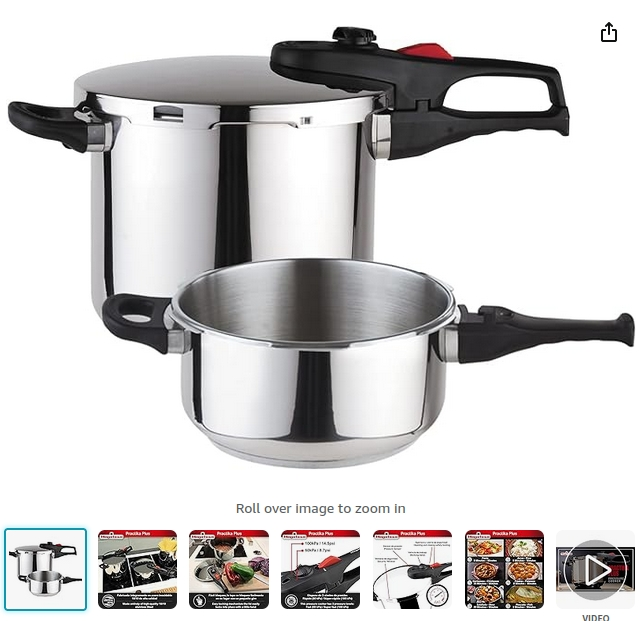I have been almost entirely Gluten and Lectin free for at least a year. Cutting out Lectins was a real challenge, and then I read (from Gundry and others) that you can mostly destroy the lectins in black beans, potatoes, and tomatoes by pressure cooking them. Other beans might be okay too, but I am going from memory and I am sure about black beans.
Not all foods with lectins can be made safe by pressure cooking. Mostly just the 3 items I listed. Please do your own research.
Gundry says not to eat these things every day, just occasionally. Personally I eat one meal a day of pressure cooked beans, potatoes, and (grass fed and finished) beef about 5 days a week.
dvoranel asked me to post on my pressure cooker. I LOVE IT! If you get one, message me and we can talk on the phone and I will share advice about it. Or join one of Marc's Zoom calls!
Magefesa® Practika Plus Super Fast pressure cooker, 4.2 and 6.3 Quart, 18/10 stainless steel, suitable induction, excellent heat distribution, encapsulated heat diffuser bottom, 5 safety systems $119 - amazon.com/gp/product/B0018...
You get 2 pots and one lid. I use the smaller pot to cook fish. You can cook a frozen cod fillet in about12 minutes. I use the larger pot to make my beef and beans.
Nowhere did I find how long to pressure cook beans to destroy the lectins, but I did find most people pressure cook beans for about 15 or 20 minutes. So I pressure cook my beans on the high setting (14.5 PSI) FOR AN HOUR!
Here is my beef and bean and potato recipe:
1: Put a big gob of coconut oil in the pot.
2: This slice a russet potato and throw it in the pot.
3: Cut up a few onions and throw them in the pot.
4: Add your spices and cook this stuff for a while on the burner. I use a metal spatula as I am just frying in the pan.
5: Once you get bored of cooking and turning the potato and onions, go ahead and add a pound of grass fed grass finished ground beef and mix it in and cook it all together until the beef is cooked.
6: Add the pound of black beans you soaked in water with salt and rinsed more than a few times into the pot, mix it all together and add enough water so the water is about an inch and a half above the beans and stuff. WARNING: THERE IS A MAX FILL LINE INSIDE THE POT. DO NOT EXCEED IT.
7: Here you need to read the instructions on the pressure cooker. Basically put the lid on and lock it and set the pressure to high (14.5 PSI) and put the heat to medium.
8: When the pressure cooker reaches the correct pressure a red button pops up on the lid. This is a good time to make sure no steam is escaping from the side of your lid. If steam is escaping from the side of your lid, what I do is turn the heat off and wait for the red button to drop (indicating you are not under pressure anymore), take the lids off and reset the gasket and try again. I have to do this about 1 time out of 5 when I pressure cook. It is no big deal at all.
8B: So you are under pressure and all is well, so you can now probably turn the heat down a little. Not too much or you will lose pressure, and then wait. For me, the clock starts on my hour of pressure cooking when the red button pops up.
9: Personally, I hang nearby for the hour I am pressure cooking. I don't think it will blow up, but I don't want to be too far away if there is a problem. After the red button has been up for an hour I turn off the heat.
10: So once you turn off the heat that red button is going to stay up for 15 or 20 minutes. Wait for the red button to drop and you are done! The lid is actually designed not to let you open it until the red button drops.
I love it.
